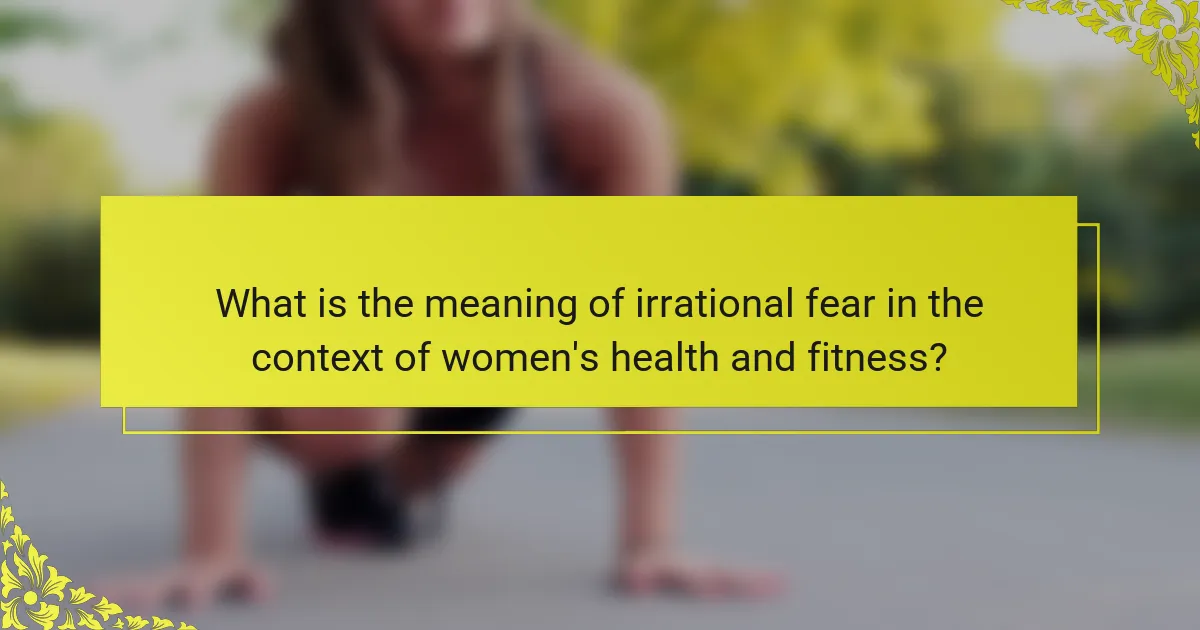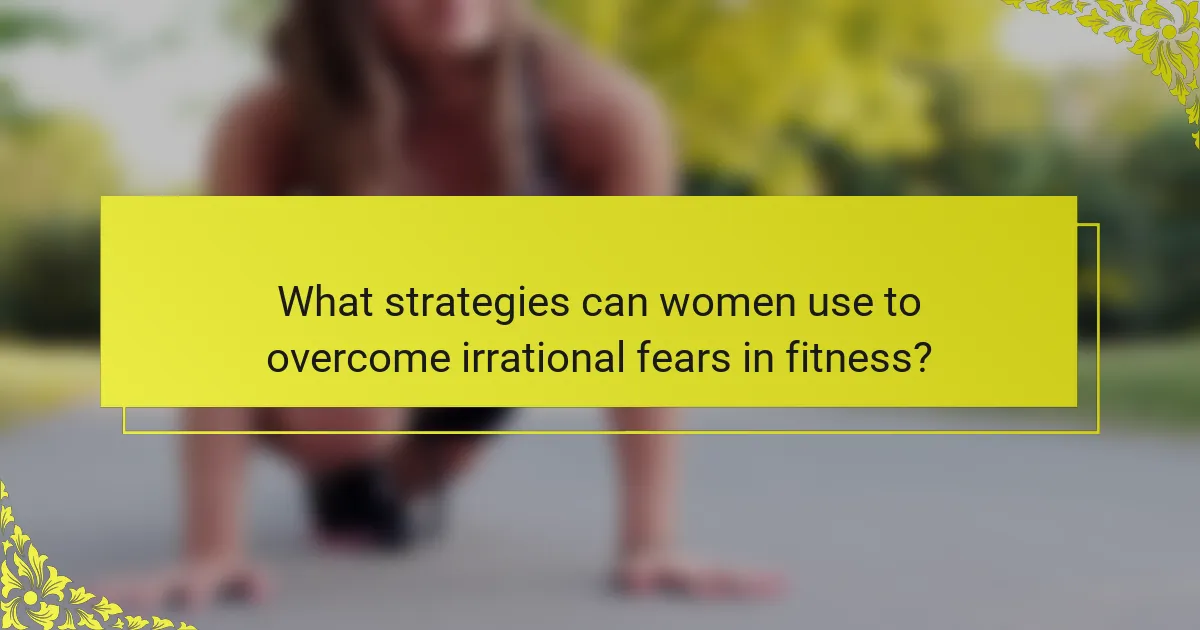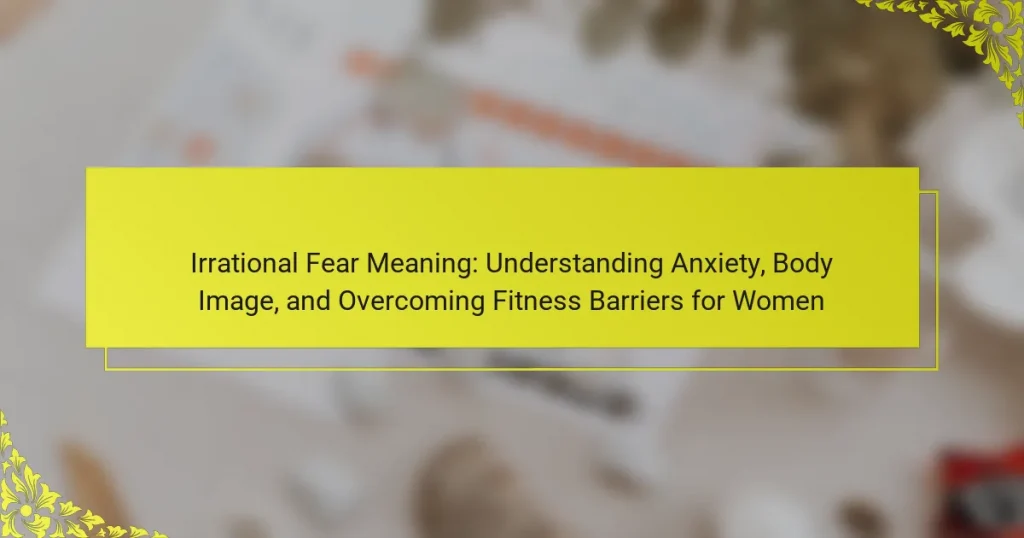Irrational fear in women’s health and fitness can significantly hinder progress and participation in physical activities. This article explores the anxiety surrounding body image, societal pressures, and the unique challenges women face. It also discusses effective strategies for overcoming these barriers, including goal setting, mindfulness techniques, and seeking social support. Understanding and addressing these fears is essential for fostering confidence and achieving fitness goals.

What is the meaning of irrational fear in the context of women’s health and fitness?
Irrational fear in women’s health and fitness refers to anxiety surrounding body image and exercise. This fear can hinder progress and lead to avoidance of fitness activities. Understanding this fear is essential for addressing underlying issues and promoting a healthier mindset. Women often face societal pressures that exacerbate these fears, impacting their confidence and willingness to engage in fitness. Overcoming irrational fears involves education, support, and gradual exposure to fitness environments, allowing women to build self-esteem and achieve their health goals.
How does irrational fear manifest in women’s fitness journeys?
Irrational fear in women’s fitness journeys often manifests as anxiety about body image and performance. This fear can hinder progress, leading to avoidance of workouts or social situations. Many women experience negative self-talk, comparing themselves to others, which exacerbates feelings of inadequacy. Overcoming these barriers requires addressing underlying beliefs, fostering a supportive environment, and focusing on personal goals rather than societal standards. Emphasizing self-acceptance and gradual exposure to fitness activities can help mitigate these fears, promoting a healthier relationship with exercise and body image.
What are common sources of anxiety related to body image?
Common sources of anxiety related to body image include societal pressures, unrealistic beauty standards, and negative self-perception. These factors can lead to feelings of inadequacy and stress, impacting mental health. Studies show that exposure to idealized images in media contributes significantly to body dissatisfaction among women. Additionally, peer comparisons often exacerbate these feelings, creating a cycle of anxiety. Addressing these sources is crucial for overcoming fitness barriers and promoting a healthier body image.
How do societal standards influence body image perceptions?
Societal standards significantly shape body image perceptions by creating unrealistic ideals. These ideals often lead to anxiety and self-doubt among women, impacting their fitness journeys. Research shows that media portrayals of beauty can skew perceptions, making women feel inadequate. As a result, many may avoid physical activities, further entrenching negative body image. Understanding these influences is crucial for overcoming fitness barriers and fostering a healthier self-image.
What role does social media play in shaping body image anxiety?
Social media significantly influences body image anxiety by promoting unrealistic beauty standards. Platforms often showcase edited images, leading to comparison and self-doubt among women. Studies indicate that frequent social media use correlates with increased body dissatisfaction, affecting mental health. This unique attribute of social media creates a cycle of anxiety and pressure to conform to idealized body types. As a result, many women struggle to overcome fitness barriers, feeling inadequate in their fitness journeys.
What are the universal effects of anxiety on women’s fitness?
Anxiety universally impacts women’s fitness by diminishing motivation, altering body image perception, and increasing barriers to exercise. Women often experience heightened self-consciousness, which can deter participation in fitness activities. This irrational fear can lead to avoidance behaviors, ultimately hindering physical health and fitness progress. Additionally, anxiety may manifest physically, causing fatigue and decreased energy levels, further complicating fitness goals. Addressing these effects involves fostering a supportive environment and promoting mental health strategies to empower women in their fitness journeys.
How does anxiety impact physical performance?
Anxiety negatively impacts physical performance by causing muscle tension, fatigue, and impaired focus. These effects can lead to decreased endurance and strength during exercise. Research shows that heightened anxiety levels correlate with lower athletic performance, particularly in women facing fitness barriers. Managing anxiety through techniques like mindfulness and cognitive-behavioral strategies can enhance physical capabilities and overall well-being.
What psychological barriers do women face in fitness?
Women face various psychological barriers in fitness, including irrational fears, anxiety about body image, and societal pressures. These barriers can hinder motivation and participation in physical activities. Research indicates that a significant percentage of women experience body dissatisfaction, leading to avoidance of fitness environments. Additionally, fear of judgment from others can exacerbate anxiety, making it challenging to engage in fitness routines. Overcoming these barriers often requires supportive communities and tailored programs that address individual concerns and promote body positivity.

What unique challenges do women encounter regarding irrational fear?
Women face unique challenges with irrational fear due to societal expectations, body image issues, and anxiety surrounding fitness. These factors can exacerbate feelings of inadequacy and hinder participation in physical activities. For instance, societal pressures often dictate unrealistic beauty standards, leading to heightened self-consciousness. As a result, women may avoid fitness environments, fearing judgment or comparison. Additionally, women are more likely to experience anxiety disorders, which can amplify irrational fears and limit their ability to engage in various activities. Addressing these challenges requires targeted support and resources to foster confidence and resilience.
How do hormonal changes affect anxiety levels in women?
Hormonal changes significantly influence anxiety levels in women. Fluctuations in estrogen and progesterone can heighten anxiety, especially during menstrual cycles, pregnancy, and menopause. Research indicates that these hormonal shifts can affect neurotransmitter systems, leading to increased feelings of anxiety. For instance, lower estrogen levels have been linked to a rise in anxiety symptoms. Understanding these connections helps women manage anxiety more effectively during different life stages.
What unique societal pressures contribute to fitness-related fears?
Societal pressures like unrealistic beauty standards and social media influence contribute significantly to fitness-related fears in women. These pressures often distort body image perceptions, leading to anxiety about physical appearance and performance. For instance, women may feel compelled to conform to idealized body types portrayed in media, which can hinder their fitness journey. Additionally, cultural expectations regarding femininity and strength can create barriers, causing women to fear judgment in fitness settings. Addressing these unique societal pressures is crucial for overcoming fitness-related barriers and fostering a healthier mindset.

What rare attributes of irrational fear should women be aware of?
Women should be aware that rare attributes of irrational fear include the fear of judgment in social situations, the fear of failure in personal goals, and the fear of inadequacy in body image. These fears can significantly hinder self-esteem and motivation. Understanding these unique attributes can help women identify specific anxieties and develop strategies to overcome them. Addressing these irrational fears is crucial for personal growth and achieving fitness goals.
How can past trauma influence current fitness barriers?
Past trauma can significantly impact current fitness barriers by instilling irrational fears related to body image and exercise. These fears may manifest as anxiety, preventing women from engaging in physical activities. Trauma can create a negative self-perception, leading to avoidance behaviors that hinder fitness progress. It is crucial to address these psychological barriers through supportive environments and therapeutic practices to foster resilience and encourage active lifestyles. Understanding the interplay between past experiences and present challenges is essential for overcoming fitness obstacles.
What are the lesser-known psychological effects of body image issues?
Body image issues can lead to lesser-known psychological effects such as increased anxiety, social withdrawal, and distorted self-perception. These impacts can create barriers to fitness and overall well-being. For example, women may experience heightened self-criticism and fear of judgment, which can hinder their motivation to engage in physical activity. Research indicates that these psychological effects are often overlooked, yet they significantly influence mental health and body image satisfaction. Addressing these issues is crucial for empowering women to overcome fitness barriers and cultivate a healthier self-image.

What strategies can women use to overcome irrational fears in fitness?
Women can overcome irrational fears in fitness by employing several effective strategies. First, they should set realistic goals that focus on personal progress rather than comparison to others. This unique attribute fosters a positive body image and reduces anxiety. Second, practicing mindfulness techniques, such as meditation or deep breathing, can help manage stress and enhance focus during workouts. Third, seeking social support from friends or fitness communities provides motivation and encouragement, reinforcing a sense of belonging. Lastly, gradually exposing themselves to feared situations in a controlled manner can desensitize the fear response, making fitness activities more approachable.
What practical steps can be taken to build body confidence?
Building body confidence involves practical steps like setting realistic goals, practicing positive self-talk, and surrounding yourself with supportive people. Engage in regular physical activity that you enjoy, as it boosts mood and self-esteem. Focus on your strengths and achievements rather than perceived flaws. Consider seeking professional guidance, such as therapy or fitness coaching, to address deeper issues related to body image and anxiety.
How can setting realistic fitness goals help?
Setting realistic fitness goals helps women overcome anxiety and body image issues by providing achievable milestones. This approach fosters a sense of accomplishment, reducing feelings of overwhelm and fear. Research shows that setting specific, measurable goals can enhance motivation and adherence to fitness routines. As a result, women can build confidence and establish a positive relationship with their bodies, ultimately breaking down fitness barriers.
What role does positive self-talk play in overcoming fear?
Positive self-talk significantly reduces irrational fear by enhancing self-confidence and resilience. It fosters a supportive inner dialogue that counters negative thoughts, promoting a healthier body image and encouraging women to overcome fitness barriers. Research shows that individuals who engage in positive self-talk experience lower anxiety levels, which directly impacts their ability to face fears effectively. By reframing challenges as opportunities for growth, positive self-talk becomes a unique attribute in the journey of overcoming fear.
What expert insights can guide women in managing anxiety?
Expert insights for women managing anxiety focus on understanding irrational fears, enhancing body image, and overcoming fitness barriers. Recognizing the link between anxiety and self-perception is crucial. Techniques such as mindfulness, cognitive behavioral strategies, and physical activity can significantly reduce anxiety levels. Building a supportive community and seeking professional guidance also play vital roles in effective management. Engaging in regular exercise can improve mood and self-esteem, which are unique attributes that help combat anxiety.
What are the best practices for fostering a supportive fitness community?
To foster a supportive fitness community, prioritize inclusivity, encouragement, and shared goals. Create an environment where women feel safe discussing anxiety and body image issues. Organize group activities that promote bonding and support, such as workout classes or wellness workshops. Utilize social media platforms to share success stories, tips, and resources, reinforcing positive body image and resilience against fitness barriers. Establish mentorship programs that connect experienced members with newcomers, fostering a sense of belonging and empowerment.
What common mistakes should women avoid in their fitness journeys?
Women should avoid common mistakes such as setting unrealistic goals, comparing themselves to others, neglecting proper nutrition, and ignoring mental health. These errors can hinder progress and reinforce negative body image. Fostering a positive mindset and focusing on individual journeys are essential for overcoming fitness barriers. Building a supportive community can also enhance motivation and accountability.
How can women create a personalized plan to tackle fitness barriers?
Women can create a personalized plan to tackle fitness barriers by identifying specific fears, setting realistic goals, and developing a supportive environment. Start by recognizing irrational fears related to body image and anxiety, as these often hinder progress. Establish measurable objectives that focus on personal achievements rather than comparisons to others. Incorporate a variety of fitness activities that align with individual preferences to enhance enjoyment and commitment. Lastly, seek support from friends, family, or fitness communities to foster accountability and encouragement, ultimately overcoming barriers effectively.




